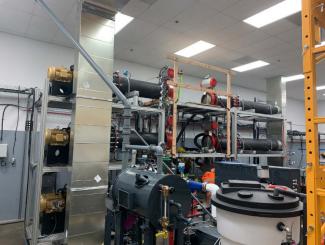Field tests of NETL-funded and managed direct air capture (DAC) technology projects in California and Alabama are helping to advance the realization of a carbon-neutral economy and energy sector to address the effects of climate change.
DAC technologiesallow for the capture of carbon dioxide (CO2) from all emission sources, addressing both current and legacy emissions to achieve negative emissions. The Carbon Dioxide Removal Program spans from applied research in materials and component systems to large-scale testing and front-end engineering and design studies to lower both capital and operating costs.
“The goal of these tests is determining how to lower energy consumption of DAC systems while minimizing water and land use,” said Andrew Jones, NETL’s CO2 removal technology manager. “Testing DAC materials in integrated field units that capture atmospheric CO2 in a relevant environment will allow for optimization of processes that decrease the cost of DAC, making them more attractive to investors. By doing this, we can make DAC a viable means of helping attain gigaton-scale removal by 2050 and support the United States in achieving a net-zero greenhouse gas emissions economy by 2050.”
In Fountain Valley, California, Electricore Inc. is leading a 12-month field test of an intensified DAC system at a Kiewit facility to capture operational data on the novel process and material combination under real conditions.
The technology combines Climeworks’ vacuum-temperature swing CO2 adsorption process with structured adsorbent beds engineered by Svante. The process employs solid sorbent laminate filter technology in which CO2 from air is chemically bound to a solid amine sorbent material and the sorbent is regenerated using vacuum- and temperature-swing desorption.
The goals of the project are to construct and operate a 30-kilogram CO2 per day integrated field test unit with multiple sorbent filter generations to inform techno-economic and life cycle analyses.
“The international team is operating an integrated DAC system for testing different conditions and maximizing DAC efficiency,” said Zachary Roberts, a project manager in NETL’s CO2 Removal and Conversion Team. “The collaboration of various technological strengths and expertise amongst the team, as well as the robust testing plan, is already producing valuable insight into making DAC more cost effective.”
Southern States Energy Board (SSEB) is partnered with AirCapture LLC to field test a solid amine sorbent-based DAC system in a commercial environment reflecting everyday conditions.
The system employs a monolithic contactor impregnated with a solid polymer that forms capture sites within the mesopores of the contactor wherein CO2 is adsorbed. The ultra-low pressure drop monoliths maximize the efficiency of air flow, increasing mass transfer of CO2 for adsorption.
AirCapture LLC designed an integrated DAC system that will use energy recovery and support services at the National Carbon Capture Center (NCCC) in Wilsonville, Alabama. A DAC skid capable of adsorbing/desorbing CO2, an energy recovery integration skid that uses process control and heat exchangers to produce the required steam for the DAC process, and a third skid capable of compressing, liquifying and purifying the CO2 have been constructed and installed at NCCC. A three-phase testing campaign will be conducted at NCCC.
“This CO2 adsorption-desorption contactor technology has been proven in the laboratory, and the integration with an energy recovery system for CO2 desorption is a way to use recoverable energy readily available at many commercial locations where DAC can be deployed,” said Naomi O’Neil, a project manager in NETL’s CO2 Removal and Conversion Team. “The results from the field testing will address critical technical barriers for the integrated process, that may lead to improvements in the capital and operational costs of DAC.”
NETL is a U.S. Department of Energy national laboratory that drives innovation and delivers technological solutions for an environmentally sustainable and prosperous energy future. By leveraging its world-class talent and research facilities, NETL is ensuring affordable, abundant and reliable energy that drives a robust economy and national security, while developing technologies to manage carbon across the full life cycle, enabling environmental sustainability for all Americans.




